After 40 years of marriage and just a few more years than that in the journalism profession, a few weeks ago Kay and I made a major, life-altering decision.
The decision was difficult for us to undertake. For months before we actually took the step, we fretted over it, analyzed it, and debated it.
Finally, we canceled our subscription to the Dallas Morning News, our local hometown daily newspaper.
No, we weren't angry at the newspaper. We actually like the Morning News a lot. (In college one summer Kay worked there writing bridal announcements in the old "Women's News Section".) Since we no longer live in Houston, Dallas' daily newspaper is the next best thing to receiving on our front porch every morning the Houston Chronicle, where we both worked for nearly 15 years.
The reason we canceled the newspaper was quite simple: seldom did we see in it anything truly "new" that we hadn't already seen on the Internet somewhere earlier. We also didn't like having to pay the newspaper's rising subscription fees year after year.
Our main hesitations were:
1. "Tradition" (ever since we married, we'd always had a newspaper delivered to our front porch. "What would a morning be like if it didn't start with me opening up the front door to retrieve the newspaper?" we wondered) and
2. Our love for the journalism profession (in which we spent most of our adult careers). Change is difficult under the best of circumstances, but when we see the profession that meant so much to us going through such gut-wrenching agony with declining advertising revenues, plummeting circulations, bankruptcies, and significant layoffs, we hated to contribute even in a small way to the depressing situation.
Eventually frugality borne on the wings of the Great Recession and plain old common sense finally won out over our emotions and attachment to tradition. Now my checkbook is fatter, my recycling bin leaner, and I even have more time to talk to my wife in the mornings while I drink my coffee.
Did we miss the newspaper?
Before we could address that question, a very strange thing happened. Apparently someone at the Morning News already had anticipated decisions by people like us.
The first day without a newspaper on our front porch a friend mentioned his puzzlement over a a smaller version of the Dallas Morning News, called Briefing, that landed in his front yard four days a week. He wondered whether someone was going to stick him with a bill some day, so he gave me a copy of the newspaper to inspect for the answer. I immediately realized that Briefing was a condensed form of the Dallas newspaper. Small and compact, it had shortened versions of most of the newspaper's main articles. It was easy and quick to read. Best of all it was delivered FREE (said so, by the way, on page 1 of every edition).
I called the Dallas Morning News to confirm that Briefing is truly free and then subscribed immediately.
Since Briefing arrives only four days a week, I occasionally miss the newspaper the other three days, but I've quickly adjusted to the change.
As I reflect on our personal decision and the newspaper's response to a changing business climate, I marvel that someone in the Morning News' leadership had the foresight and wisdom to break with the newspaper's own traditions and prepare for a future very much unlike its present or past. Many call newspapers a dying breed; what's really dying are newspapers’ abilities to "break" news stories ahead of other media, to charge readers for their "breaking" news, and to do business "as we've always done it".
All around us incredible changes are occurring at the speed of sound. Even churches, so often the bastions of complacency, are changing—maybe not as fast as they can, should, or need to. Rapid change seems inevitable today for every institution and person, including churches and other houses of worship.
"Change or die" is an old slogan. "Change or get run over in the stampede" is another way I would put it.
Had I known the Morning News was ahead of its game (but deftly not sending me a notice that I didn't have to keep paying my subscription fees in order to get its smaller paper), I doubt that I would have dallied for nearly a year before I canceled my subscription.
Next time I won't fret for so long over making a change I know in my heart is necessary. I hope I can say similar words like I said about the far-thinking approach at the Dallas Morning News about changes that need to occur in other institutions in our lives.






No comments:
Post a Comment